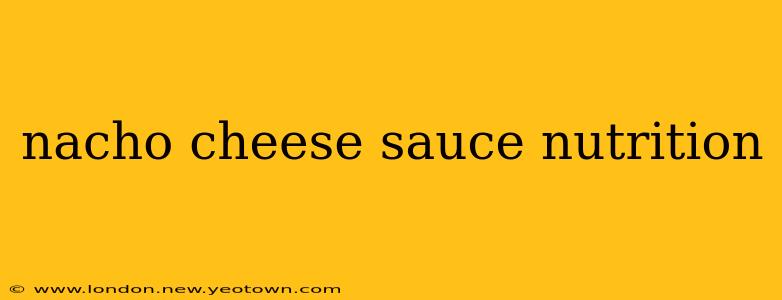Let's be honest, that gooey, cheesy, slightly spicy nacho cheese sauce is the star of the show. It transforms humble tortilla chips into a fiesta of flavor, elevates a simple burger to epic proportions, and makes even the plainest potato a culinary adventure. But behind that deliciousness lies a nutritional profile that's worth understanding. This isn't about shaming your nacho cravings; it's about making informed choices and savoring your favorite treat with a little more awareness.
What are the Main Ingredients in Nacho Cheese Sauce?
The foundation of most nacho cheese sauces is a blend of cheeses (typically cheddar, but often a mix), milk or cream, and butter or oil. From there, the recipe can take many delightful turns. Some versions incorporate spices like chili powder for a kick, while others add a touch of onion or garlic powder for savory depth. Many commercial brands also include stabilizers, emulsifiers, and preservatives to ensure a smooth texture and longer shelf life.
How Many Calories are in Nacho Cheese Sauce?
This is where things get a little tricky. The calorie count varies dramatically depending on the ingredients and the brand. A typical serving (around ¼ cup) of store-bought nacho cheese sauce can range from 150 to 250 calories, sometimes even higher. Homemade versions can be more variable, with the calorie count heavily influenced by the type and amount of cheese and fat used.
What is the Fat Content of Nacho Cheese Sauce?
Fat is a significant component of nacho cheese sauce, contributing significantly to both its flavor and its calorie count. Much of this fat is saturated fat, which should be consumed in moderation as part of a balanced diet. The exact fat content will vary depending on the recipe, but expect a considerable portion of the calories to come from fat.
Is Nacho Cheese Sauce High in Sodium?
Yes, many nacho cheese sauces are quite high in sodium. Sodium is used as a flavor enhancer and a preservative, and excessive sodium intake can negatively impact blood pressure and overall health. Be mindful of your sodium consumption, especially if you're watching your salt intake for health reasons. Check the nutrition label carefully before indulging.
What About the Carbohydrate and Sugar Content?
While nacho cheese sauce is not typically a high-carbohydrate food, it can contain some carbohydrates, mostly from added sugars and the milk solids in the sauce. The amount of added sugar can vary widely depending on the brand and recipe.
Is There a Healthier Way to Enjoy Nacho Cheese Sauce?
Absolutely! While it’s difficult to make nacho cheese sauce completely “healthy,” you can make some smarter choices. Opt for lower-fat cheese alternatives, use less butter or oil, and avoid heavily processed brands. Consider homemade versions that allow you to control the ingredients and minimize added sugars and sodium. And remember, moderation is key! A small portion of delicious nacho cheese sauce as part of a balanced meal is perfectly acceptable.
Can I Make My Own Nacho Cheese Sauce?
Making your own nacho cheese sauce is a fantastic way to control the ingredients and create a healthier version. Numerous recipes are available online, ranging from simple to sophisticated. Experiment with different types of cheese, spices, and add-ins to find your perfect recipe.
In the end, enjoying nacho cheese sauce is all about balance. Understanding its nutritional profile allows you to make informed choices and savor this delicious treat guilt-free (or at least, with a bit less guilt!). Remember to always check the nutrition label and consider making your own to control ingredients and portion sizes.

